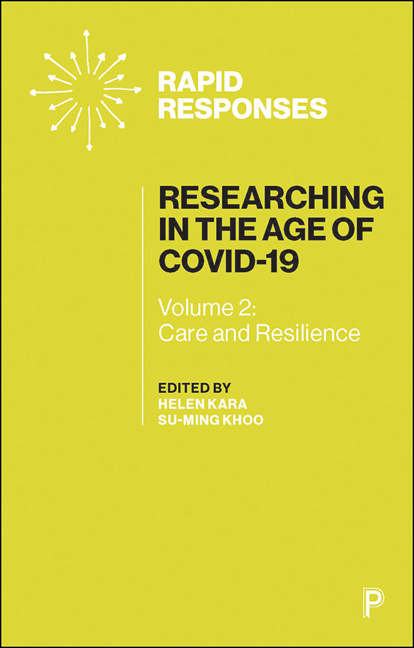Introduction
Published online by Cambridge University Press: 23 March 2021
Summary
As the COVID-19 pandemic hit the world in the early months of 2020, researchers have had to react – responding to and rethinking their ongoing and near-future research. As researchers have begun to adapt their research methods to a world that is continuing in a pandemic response mode for the medium and longer term, there are also opportunities to reflect more deeply and widely on fundamental issues and assumptions, and to reconsider ethics beyond the necessary, but limited formal procedures of institutional research ethics approval. Researchers in every part of the globe have responded to the new challenges of researching amid the COVID-19 pandemic in diverse, thoughtful and creative ways – from adapting their data-collection methods to rethinking researcher–researched relationships and fostering researcher and community resilience, while accommodating mutual needs for care.
The problem of vulnerability becomes more salient in emergencies and disasters like the current global health emergency. This points research towards the question of how it can contribute to the obvious and immediate necessary actions to save lives and deliver relief and help, but also highlights broader responsibilities to ameliorate conditions that produce or worsen vulnerability and places a magnifying glass on conditions of structural injustice and economic violence. The need to uphold principles like human rights and global solidarity becomes more salient in such conditions (ten Have, 2018, pp 490–491). Resilience is what emerges out of crisis. It is the capacity to respond to, and move through, crisis. Researchers and participants continue to communicate and foster relationships through situations of disaster and emergency. In moving through shared experiences and challenges, researchers, research participants and communities may collaboratively adapt and change assumptions, behaviours, processes and structures (Goldstein, 2012), both within the research relationships and beyond, to re-create intention and a sense of community that serves the research process, but also other, wider transformative goals.
This book is the second volume in a series of three Rapid Responses. Together, we hope that these books help academic, applied and practitioner-researchers worldwide to adapt to the new challenges COVID-19 brings.
- Type
- Chapter
- Information
- Researching in the Age of COVID-19Volume II: Care and Resilience, pp. 1 - 6Publisher: Bristol University PressPrint publication year: 2020

